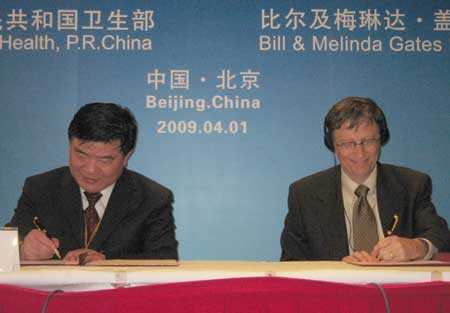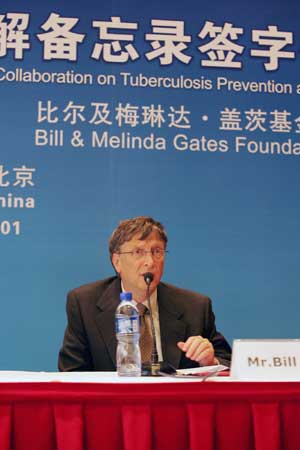|

|
|
Chinese Health Minister Chen Zhu (L) signs the Memorandum on the Understanding of Collaboration of Tuberculosis Prevention with Bill Gates, founder of the Bill & Melinda Gates Foundation in Beijing, capital of China, on April 1, 2009. [Xinhua/He Lulu]
|
China's health ministry and international software tycoon Bill Gates are teaming up to improve detection and treatment of tuberculosis (TB) in the country.
China will introduce new diagnostic tests, TB drugs, patient monitoring strategies and health care worker training by using US$33 million provided by the Bill & Melinda Gates Foundation.
Gates made the announcement Wednesday at a meeting with health ministers and officials from some 30 countries and regions.
|

|
|
Bill Gates, founder of the Bill & Melinda Gates Foundation, speaks at the signing ceremony of the Memorandum on the Understanding of Collaboration of Tuberculosis Prevention in Beijing, capital of China, on April 1, 2009. [Xinhua/He Lulu]
|
The five-year program is aimed at helping China, whose number of TB cases are the second highest in the world, address the rising problem of drug resistance in TB control, Gates said.
"TB is an increasing threat because of gaps in the way the disease is diagnosed and treated," he said. "This partnership will help cut off drug resistance at its source."
China reported 1.3 million new TB cases including 112,000 new multidrug-resistant TB (MDR-TB) cases in 2007, according to the World Health Organization (WHO).
Chinese health minister Chen Zhu said the project would be carried out in 20 cities in the next five years. The goal is to treat 50,000 TB patients each year.
WHO Director-General Margaret Chan said at the meeting that the world faced a "precarious situation" due to the emergence and spread of drug-resistant TB.
Although TB is preventable and treatable, when the TB bacillus becomes resistant to the two most powerful first-line anti-TB drugs, the disease develops into MDR-TB.
The more serious extensively drug-resistant TB (XDR-TB), a sub-strain of MDR-TB that developed from the highly drug-resistant strains, has been reported in more than 50 countries -- mainly in Asia, Africa and Europe, according to the WHO.
The organization blamed improper use of drugs and mismanagement of treatment for causing multi-drug resistance.
(Xinhua News Agency April 2, 2009)